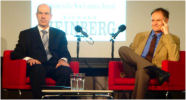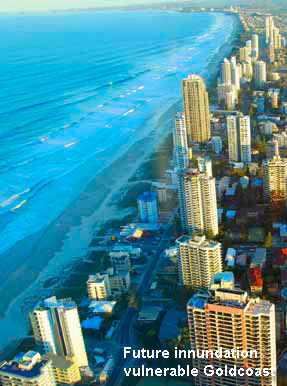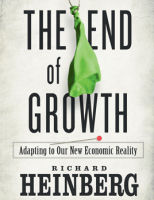Melbourne reacts to Richard Heinberg
 Report on Richard Heinberg's tour of Australia, Melbourne talk: We should remember that the economy is a subset of the environment and that 'not sustainable' does not mean 'insufficiently eco-groovy'. Heinberg pointed to Australia's growing reliance on petroleum and its decreasing production and suggested that the policy of growing our population needs a profound rethink. Some strange and interesting responses from the audience. And a standing ovation for Australian MP Kelvin Thomson, who was chairing Heinberg's session. Not to mention Jenny Warfe - a terrific new Vice President for SPA Victoria and Tasmanian Branch.
Report on Richard Heinberg's tour of Australia, Melbourne talk: We should remember that the economy is a subset of the environment and that 'not sustainable' does not mean 'insufficiently eco-groovy'. Heinberg pointed to Australia's growing reliance on petroleum and its decreasing production and suggested that the policy of growing our population needs a profound rethink. Some strange and interesting responses from the audience. And a standing ovation for Australian MP Kelvin Thomson, who was chairing Heinberg's session. Not to mention Jenny Warfe - a terrific new Vice President for SPA Victoria and Tasmanian Branch.
Energy, Debt, Climate Change, Overpopulation
(The following is based on notes taken from Richard Heinberg's excellent talk and does not purport to be verbatim.)
Plentiful energy in the early 20th Century caused a 'problem' of overproduction. Consumers did not have the income to keep up. Tactics to overcome this structural resistance included advertising, planned obsolescence, fashion (bringing out new models), and, most of all, credit (i.e. debt.)
Credit is a key factor producing economic growth. Delinking money from precious metals helped this along because money could be created with little restraint.
Heinberg identifies the 1980s as a turning point and cites Robert F. Gordon, "Is US Economic Growth over?" (NBER Working Paper No. 18315, August 2012.) Gordon writes that there have been three periods of technological engineering leading to industrial growth:
1. Coal, steampower
2. Oil and electrification early 20th century
3. Computers, internet, cell phones etc.
The third phase does not generate as much economic growth as previous technological changes.
Globalisation, debt and economic growth
Globalisation has posed a problem for growth because, by internationalising wage competition, it drives wages, and therefore purchasing capacity, downwards. In the US, says Heinberg, the average wage is at levels of 1973.
More debt has been used as a strategy to get low income earners to purchase more consumables and to sure up economic growth.
Debt is now growing three times faster than GDP.
The Financialisation of the Economy
This financialisation of the economy has meant expansion of the Financial Industry. The Industry hs gained political power and the ability to influence profound changes in financial legislation.
But, says Heinberg, with the Global Financial Crisis (GFC) we reached the limits to debt.
Problems with current political-economic system
Lack of redundancy makes the system fragile. Heinberg talks about how ridiculous it is to make countries into specialist economies, evoking the danger of reliance on trading for most vital resources.
Like most peak-oilers he advocates relocalisation. The reasons are many but one of the main ones is the energy cost of transport. Our current land-use planning relies on us using cars. The only way to avoid reliance on cars (which will become too expensive to run as petroleum runs down) will be to redesign, default back to land-use that makes it possible to walk or cycle to town centers, and to grow and distribute most food and materials locally. At the moment the system discourages local initiatives to supplement or supply food and materials.
We need to stop using the GDP as a measure of production because it privileges any activity that makes money, without heed to the harm it might do.
We should encourage alternative currencies, worker ownership, and population stabilisation.
Australia's growing population problems - what do we think we are doing!
Heinberg gave Australia's population problems quite a lot of attention, focusing on our declining oil production and our growing consumption of fuels, asking is it really sensible to contemplate the signs of a long future financial decline and still grow the population by importing more and more people?
On Energy and Climate
We need low energy transportation, low energy buildings, low energy agriculture and renewable energy sources. Of course no-one should expect to have anything like the current level of economic activity based on these.
We should remember that the economy is a subset of the environment and that 'not sustainable' does not mean 'insufficiently eco-groovy'.
What's not peak
Community, satisfaction with honest work well done, intergenerational solidarity, artistry, beauty of built environment, happiness, healthy environment, cooperation.
Audience Response
As one familiar with peak resources and population discussions from way back, I was not too surprised by some of the questions, however I learn something each time.
Iceland and middle class attitudes
I asked Heinberg if he thought it would be a good idea to talk about how Iceland has refused to pay its GFC 'debt' and is pursuing 200 bankers on criminal charges. I added that people could benefit from realising that most of the countries in Continental Europe do not suffer from the same rapid population growth as Australia and other Anglophone economies.
Richard said that Iceland was a shining example and its economy, released from debt, had rebounded.
At this a young man behind me gave his spirited opinion that it was not so impressive to go from zero to zero. He seemed not to consider the importance of a people being freed from debt, but that might be explained by the fact that he identified himself as employed in the Financial Industry. He described himself as having only recently escaped a life of despair on a country farm for his employment in Melbourne. Remarking that there was far more community spirit in the country than in Melbourne, he nonetheless warned somewhat contemptuously that that most of this middle-class audience would experience a rude awakening from their romantic ideas about self-sufficiency if they chose to return to the land.
Clearly the importance of our economic reliance of fossil fuels - notably petroleum - simply had not sunk in at all. He seemed to think that the whole talk was about some kind of philosophical attitude, rather than a forewarning on survival in hard times to come.
Richard Heinberg's reply was that relocalisation and self-sufficiency wasn't about 'choice'. It was about dealing with an unavoidable situation. He said that his own father had been raised on a subsistence farm but had managed to get to the city and become the first in the family to get a university education. Richard added that he and his wife lived on a large block in a city where they had numerous fruit and nut trees and hens, and that, although it was sometimes hard work, they had more fun now than they had ever had.
What I learned from this exchange was that one psychological way of not dealing with finite resources is to assume that they are somehow discretionary. Though how a farm-boy could fail to appreciate the importance of petroleum defeats me, unless this young man is an indicator of how modern schools, even in rural areas, teach within paradigms separate from rural reality.
Goldcoast Climate change refugees
Another young man, closer to the front of the audience, whilst acknowledging that population poses a problem in Australia asked, "But what should Australia do about climate change refugees from poor countries? Don't we have an obligation to take some? How many should we take?
This view seemed to me to indicate that the person asking the question had somehow assumed that peak oil, global warming and financial implosion would only affect the 'third world'. Hence his question was, given the need to limit Australia's population size, what should our position be on climate change refugees? The picture was painted of millions seeking entry to our safe and prosperous shores.
I would have liked to asked him why he seemed to assume that Australia's economy will somehow not implode with the rest of the world's and that our own population will not be affected by sea-level rise, given that most of our populations live in coastal cities. We have seen what several feet rise in river levels did for the Brisbane CBD during the floods in 2011. Well, the Brisbane River opens onto the sea, which means, if there is a rise in sea levels, the CBD is likely to be inundated.  As for the Gold Coast; those hundreds of skyscrapers lining the beach are completely vulnerable to permanent deluge. Their location is a testimony to shortsightedness and opportunistic investment overseen by negligent councils and state governments.
As for the Gold Coast; those hundreds of skyscrapers lining the beach are completely vulnerable to permanent deluge. Their location is a testimony to shortsightedness and opportunistic investment overseen by negligent councils and state governments.
Sydney Harbour will have its valleys inundated. Port Philip Bay and Hastings (enclosing the Mornington Peninsula where developers are planning to build many new suburbs, a new railway, tollways and to massively increase cargo traffic), are doomed to lose many buildings. Likewise for Perth (on the Swan River), Darwin on the sea, Adelaide, and so many other towns and cities.
The same can be said, in metaphor, for our economy. Look at how Campbell Newman, the new Queensland Premier, has used recent floods as an excuse to sell off more assets and close down jobs!
Standing ovation for Kelvin Thomson
Throughout this talk I was impressed with the organisation of the event by SPA members and Vice President of SPA Victoria and Tasmania, Jenny Warfe (of Blue Wedges fame)'s presence. Her introductions of the event and the speakers set an excellent tone for the evening. Kelvin Thomson MP formally introduced Richard Heinberg, but he did not overshadow the main speaker.
Some questions later targeted Thomson's knowledge of local population policy problems. He answered some, but mostly deferred to Heinberg. Unusual for an Australian politician in such an event, the audience gave Kelvin a standing ovation and a number of people spoke of how grateful they were to him for representing Australians' democratic opinion on high immigration numbers, overpopulation and overdevelopment. Richard Heinberg, naturally received very strong applause and was obviously greatly appreciated.
The Significance of this event and the way forward for the Counter-Growth Lobby
This event, which took place at the Wheeler Centre in Melbourne, was unusually well attended for a counter-growth lobby population and resources lecture in Australia. The speaker, Richard Heinberg, has received far more coverage than any other non-Cornucopian population and resources speaker that I remember, apart from Tim Flannery perhaps. Sustainable Population Australia members in each state who set up his speaker tour deserve credit. Although Jill Quirk, the Victorian and Tasmanian President was unable to attend due to unforseeable events, her work in organising the branch response was vital.
The only criticism one can make is that more Australian speakers should be on this particular counter-growth lecture circuit and SPA has a number of good ones in its branches that it simply fails to promote, year after year, despite being the peak body in this field. SPA has symptoms of clique and cringe syndrome. If SPA only recycles the same national leaders and will not promote locals to prominence in speaker events and as spokespersons, its message will always be eclipsed by the mainstream and property development media, which are constantly anointing their own talking heads, with effect, despite little concern for quality. In fact raising the profile of good activists, no matter how humble, is one of the Candobetter.net's most important activities.
The Centre for the Advancement of the Steady State Economy (CASSE) and the Australian Conservation Foundation (ACF) were also involved in supporting this event.
This article was meant to appear yesterday but, owing to a bug in Acrobat that freezes the screen whenever I try to read an acrobat article, I had to reboot and lost everything I wrote yesterday.

 Kelvin Thomson MP will be chairing Richard Heinberg's talk about his book, The End of Growth 7.30pm. on Saturday 22 September 2012 at The Wheeler Centre, 176 Little Lonsdale Street. Heinberg is a well-known peak oil blogger and writer who delivers an entertaining and stimulating message on the serious subject of resource depletion which Australian governments and development and financial planners at all levels simply cannot cope with. At a time when Australia continues to back military intervention in the oil-rich Middle East, Richard's talk is especially topical. As well as that, it is the reality we all must deal with. So go along and then take the message back to your state and federal political representative and your growth-obsessed local council.
Kelvin Thomson MP will be chairing Richard Heinberg's talk about his book, The End of Growth 7.30pm. on Saturday 22 September 2012 at The Wheeler Centre, 176 Little Lonsdale Street. Heinberg is a well-known peak oil blogger and writer who delivers an entertaining and stimulating message on the serious subject of resource depletion which Australian governments and development and financial planners at all levels simply cannot cope with. At a time when Australia continues to back military intervention in the oil-rich Middle East, Richard's talk is especially topical. As well as that, it is the reality we all must deal with. So go along and then take the message back to your state and federal political representative and your growth-obsessed local council.
Recent comments